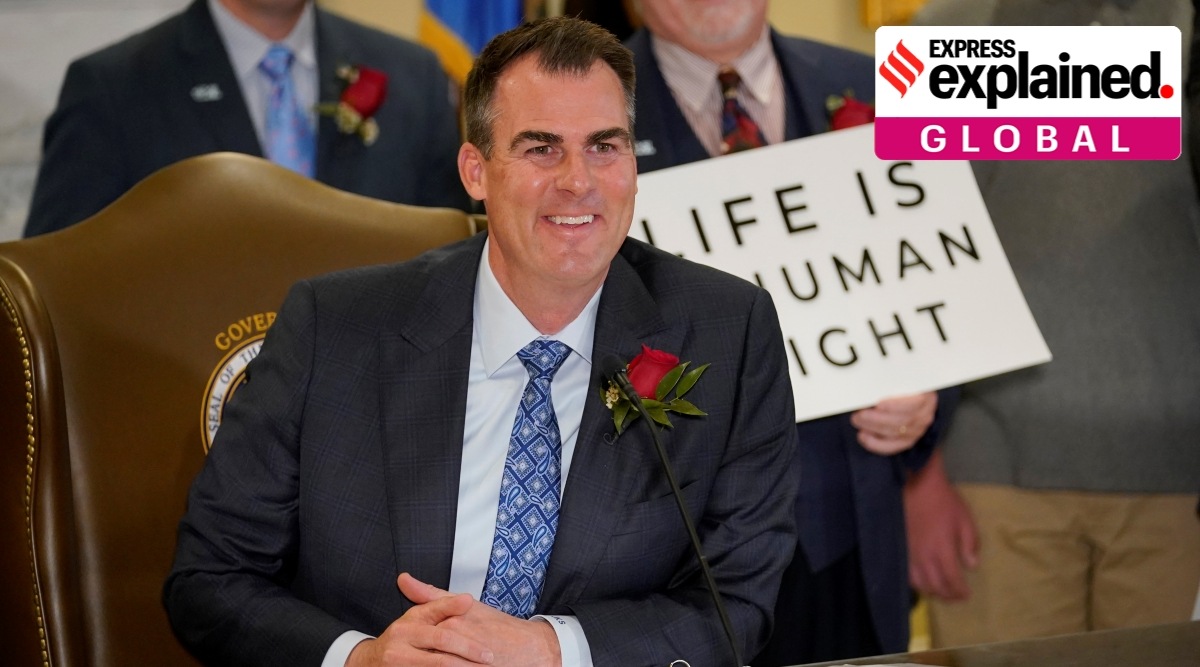Explained: Oklahoma’s anti-abortion bill, which bans nearly all abortions in the state
This is not the only anti-abortion legislation in Oklahoma. A state House committee last week advanced another bill, which will allow private citizens to take civil action against abortion providers.
 Oklahoma Gov. Kevin Stitt speaks after signing into law a bill making it a felony to perform an abortion, punishable by up to 10 years in prison, Tuesday, April 12, 2022, in Oklahoma City. (AP)
Oklahoma Gov. Kevin Stitt speaks after signing into law a bill making it a felony to perform an abortion, punishable by up to 10 years in prison, Tuesday, April 12, 2022, in Oklahoma City. (AP)Oklahoma Governor Kevin Stitt Tuesday signed an anti-abortion bill banning nearly all abortions in the state of Oklahoma.
Last year, the Oklahoma house had voted 70 to 14 to pass Bill 612 in the Senate. It will come into effect on August 26 this year.
Oklahoma, which was the next stop destination for Texas women who wanted to abort pregnancies after Texas banned the practice last year, is the latest Republican state to ban nearly all abortions. The bill is different from other states’ in that it is more stringent, leaving none but one exception where abortion can be legal.
Stitt said while signing the bill, “We want to outlaw abortion in the state of Oklahoma… I promised Oklahomans that I would sign every pro-life bill that hits my desk, and that’s what we’re doing here today.”
This is not the only anti-abortion legislation in Oklahoma. An Oklahoma House committee last week voted to advance Bill 1503, or the Oklahoma Heartbeat Act, modelled after the Texas ‘heartbeat’ law. This bill will allow private citizens to take civil action against abortion providers.
What is Oklahoma’s abortion ban bill?
The bill the Governor signed on Tuesday lays down that anyone convicted of performing an abortion will face up to 10 years in prison and a fine of $100,000.
The only exception is if a woman’s life is in danger due to a medical emergency in the pregnancy.
The bill defines a medical emergency as “ a condition which cannot be remedied by delivery of the child in which an abortion is necessary to preserve the life of a pregnant woman whose life is endangered by a physical disorder, physical illness or physical injury including a life-endangering physical condition caused by or arising from the pregnancy itself”.
 The bill also does not ban the sale, usage or prescription of any contraceptive measures, drugs or chemicals “if the contraceptive measure, drug or chemical is administered before the time when a pregnancy could be determined through conventional medical testing and if the contraceptive measure, drug or chemical is sold, used, prescribed or administered in accordance with manufacturer instructions”.
The bill also does not ban the sale, usage or prescription of any contraceptive measures, drugs or chemicals “if the contraceptive measure, drug or chemical is administered before the time when a pregnancy could be determined through conventional medical testing and if the contraceptive measure, drug or chemical is sold, used, prescribed or administered in accordance with manufacturer instructions”.
Criticism of Bill 612
The bill has been widely criticised by many human rights and abortion rights organisations.
“Unless blocked by the courts, it would be just as destructive for Oklahomans and their neighbors, since it will eliminate access and force thousands of patients to turn elsewhere for care,” ACLU Oklahoma said in a statement.
While abortion rights in the US are protected under the 1973 Roe vs Wade Supreme Court judgement, the current SC leans conservative, leading to fears that legal challenges to these laws may not stand. The court recently allowed the Texas abortion curbs to remain in place.
Planned Parenthood Great Plains Votes CEO Emily Wales said in a statement, “It’s a very dark day in Oklahoma. We have been in the middle of a crisis for the last seven months — as Texans have been forced to leave their home states for care — and now Oklahomans may have to do the same. It’s unconscionable.”
Planned Parenthood Action Fund President Alexis McGill Johnson has said, “This ban, like all abortion bans, will harm real people — people who are making a decision that they know will be best for themselves, their lives, their families, and their futures.”
The other anti-abortion bill in Oklahoma
Late in March this year, the Oklahoma Senate house passed a Texas-style legislation.
“The measure specifies that the act will be enforced exclusively through private civil actions with certain requirements,” the bill says.
The exceptions under the bill, which Stitt has indicated he will be signing, are medical emergencies that threaten the life of a woman and rape or sexual assault. The fine under the bill is $10,000.
Trust Women Advocacy Director Myfy Jensen-Fellows said, “Not a single one of these bills will end abortions in Oklahoma. They will push people further to the margins, force people to carry pregnancies that are dangerous to their own health, or take greater risks to find abortion care wherever they can. For seven months our clinics have seen first-hand the impact of the health care crisis created by Texas’s S.B. 8 — the legislation that has emboldened anti-abortion legislators across the country.”
Newsletter | Click to get the day’s best explainers in your inbox
- 01
- 02
- 03
- 04
- 05






































